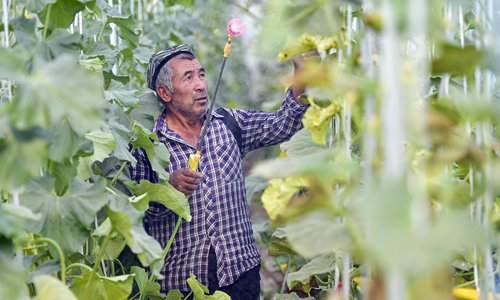HOME >> CHINA
8,000 technology inspectors boost Xinjiang’s poverty-alleviation work
Source:Global Times Published: 2019/11/7 17:43:41

Photo: VCG
Northwest China's Xinjiang Uyghur Autonomous Region has sent about 8,000 technology inspectors to broaden agricultural skills among the region's residents in an effort to support poverty reduction.
The inspectors have provided 1,824 new technologies and introduced 1,925 new species in Xinjiang, according to the statistics from the Science and Technology Department of the autonomous region, the Xinhua News Agency reported on Thursday.
The trial of the technology inspection system in Xinjiang started in 2002 and expanded to the whole region in 2007, according to the report.
Around 460,000 farming households have participated in projects with technology inspections, among which 340,000 have seen their household income increase.
The farmers have received 1.3 million copies of materials on agricultural skills.
A total of 553 people have built economic cooperation organizations and professional associations.
The system covers 87 cities and counties in Xinjiang, including 22 deep poverty-stricken counties and villages.
According to the report, in 2018, Xinjiang invested 20 million yuan ($2.9 million) in the system.
Yushanjiang Memet is one of the technology inspectors. He is an associate research fellow at the Botanic Protection Institute at Xinjiang Academy of Agricultural Sciences.
On October 29, Yushanjiang helped farmers in Shule county sell "Fubo" melons, and brought plant samples damaged by disease and insects back to the lab in Urumqi for further test, the Xinjiang Daily reported on Monday.
The "Fubo" melon is a new species Yushanjiang has been promoted in Shule, which has lifted farmers out of poverty.
Zunong Kadier, a poverty-stricken villager in Shule, planted 5 mu (about 3.3 hectares) of "Fubo" melons and earned 40,000 yuan in 2018. This year he increased the farm to 10 mu. "The melons are planted under experts' direction. The quality is guaranteed," he said.
According to Xinjiang's Science and Technology department, the technology inspection system will be expanded in southern Xinjiang's four prefectures and new creation of start-up projects will be encouraged, the Xinjiang Daily reported.
Global Times
Posted in: SOCIETY,CHINA FOCUS